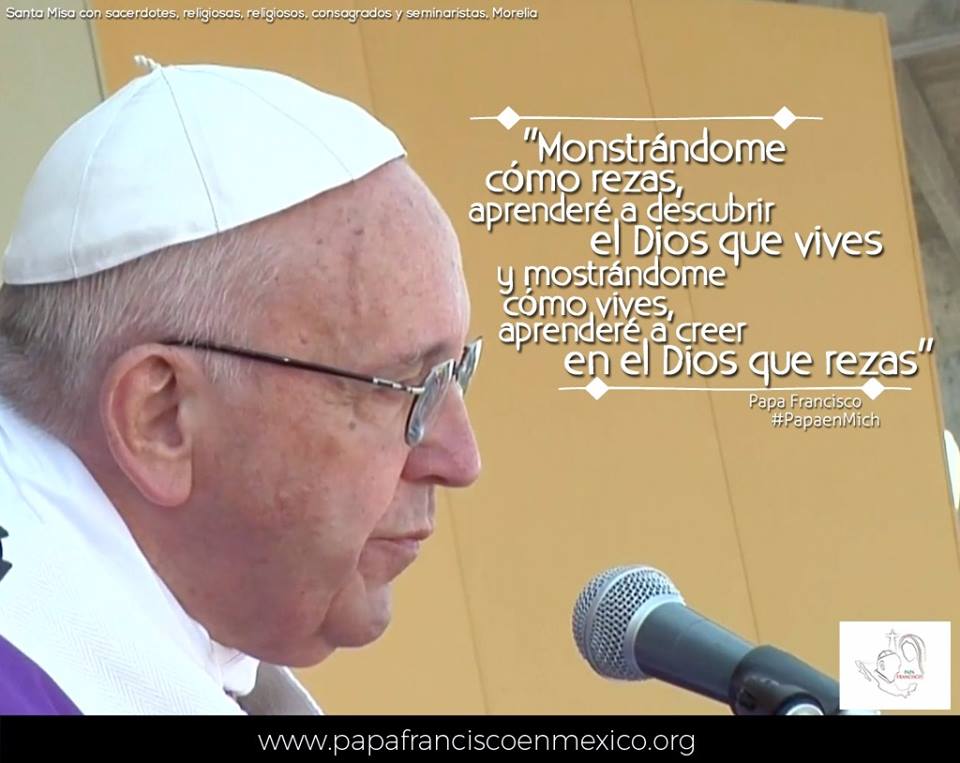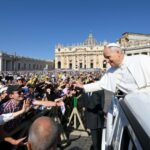Homily of Pope Francis to
priests, seminarians, religious men and women
Morelia, February 16, 2016
There is a saying that goes: “Tell me how you pray and I will tell you how you live, tell me how you live and I will tell you how you pray,” because by showing me how you pray, I will learn to discover the God you live and, by showing me how you live, I will learn to believe in the God you pray to; because our life speaks of prayer and prayer speaks of our life; because our life speaks in prayer and prayer speaks in our life. Prayer is learned just as we learn to walk, to speak, to listen. The school of prayer is the school of life, and in the school of life is where we make the school of prayer.
Jesus wanted to introduce His followers into the mystery of Life, into the mystery of His life. He showed them through eating, sleeping, healing, preaching, praying, what it means to be the Son of God. He invited them to share His life, His intimacy, and being with Him, He made them touch in their flesh the life of the Father. He makes them experience in their gaze, in their walk, the strength, the novelty of saying: “Our Father.” In Jesus, this expression does not have the “taste” of routine or repetition; on the contrary, it tastes of life, of experience, of authenticity. He knew how to live praying and praying while living, saying: Our Father.
And He has invited us to the same. Our first call is to experience that merciful love of the Father in our lives, in our history. His first call is to introduce us into this new dynamic of love, of sonship. Our first call is to learn to say “Our Father,” to say Abba.
Woe to me if I do not evangelize! says Paul. Woe to me! because evangelizing — he continues — is not a reason for glory but a necessity (cf. 1 Cor 9:16).
He has invited us to participate in His life, in the divine life; woe to us if we do not share it, woe to us if we are not witnesses of what we have seen and heard, woe to us. We are neither nor do we want to be officials of the divine, we are neither nor do we want to be employees of God, because we are invited to participate in His life, we are invited to enter into His heart, a heart that prays and lives saying: “Our Father.” What is the mission but to say with our life: “Our Father”?
To this Our Father, we pray insistently every day: do not let us fall into temptation. Jesus Himself did it. He prayed so that His disciples — of yesterday and today — would not fall into temptation. What could be one of the temptations that might besiege us? What could be one of the temptations that arises not only from contemplating reality but from walking it?
What temptation can come from environments often dominated by violence, corruption, drug trafficking, contempt for human dignity, indifference to suffering and precariousness? What temptation can we have again and again in front of this reality that seems to have become an unchangeable system?
I believe we could summarize it with the word resignation. In front of this reality, one of the favorite weapons of the devil can win us: resignation. A resignation that paralyzes us and prevents us not only from walking but also from making a path; a resignation that not only terrifies us but also entrenches us in our “sacristies” and apparent securities; a resignation that not only prevents us from proclaiming but also from praising. A resignation that not only prevents us from projecting but also from risking and transforming.
That is why, Our Father, do not let us fall into temptation. How good it is to call upon our memory in moments of temptation.
How much it helps us to look at the “wood” from which we were made. Not everything began with us, not everything will end with us, so how good it is to recover the history that has brought us here.
And, in this act of remembering, we cannot skip someone who loved this place so much that he became a son of this land. Someone who knew how to say of himself: “They took me out of the magistracy and put me at the helm of the priesthood, by merit of my sins. I, useless and entirely unfit for the execution of such a great enterprise; I, who did not know how to handle the oar, was chosen as the first Bishop of Michoacán” (Vasco Vázquez de Quiroga, Pastoral Letter, 1554).
With you, I want to remember this evangelizer, also known as Tata Vasco, as “the Spaniard who became Indian.” The reality lived by the Purhépecha Indians, described by him as “sold, abused, and vagabonds in the markets, gathering the scraps thrown on the ground,” far from leading him to temptation and the bitterness of resignation, moved his faith, moved his life, moved his compassion, and prompted him to make various proposals that would be a “breath of relief” in the face of this so paralyzing and unjust reality. The pain of his brothers’ suffering became prayer, and prayer became response. That earned him the name among the Indians of “Tata Vasco,” which in Purhépecha means: Dad.
Father, Dad, Abba.
That is the prayer, that is the expression to which Jesus invited us.
Father, Dad, Abba, do not let us fall into the temptation of resignation, do not let us fall into the temptation of losing memory, do not let us fall into the temptation of forgetting our elders who taught us through their lives to say: Our Father.










